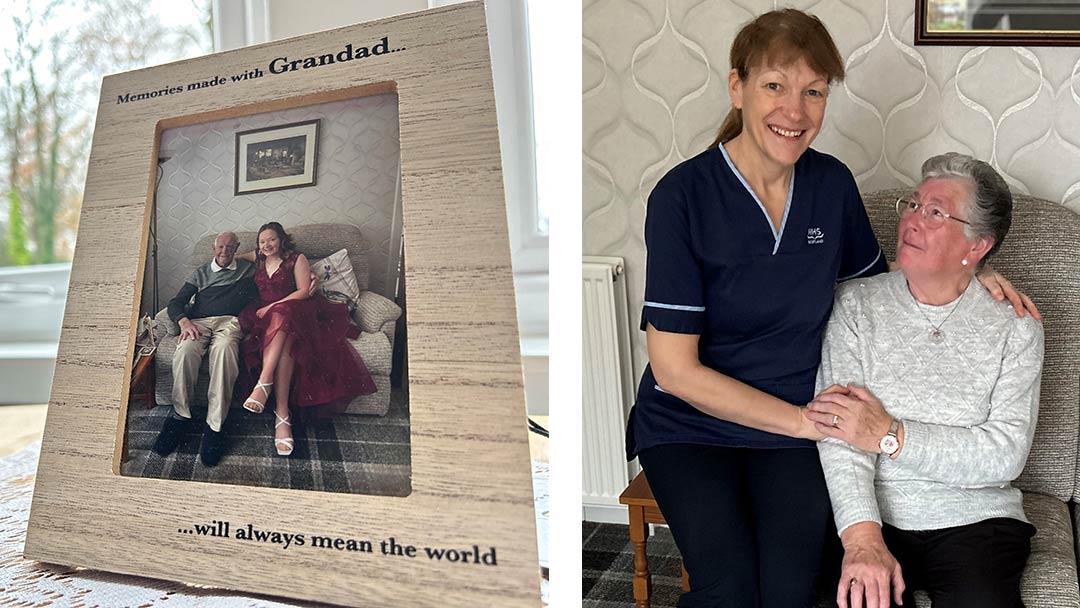The late Mike Hobbs pictured with his granddaughter Zara & Gailene Cochrane, who manages the Lanark community nursing team with Morag Hobbs.
End-of life care is one of the most poignant and sensitive areas of health and care delivery, especially during what can be the darkest of times. Lanarkshire’s Community Nursing (End of Life care) service, led by South Lanarkshire Health and Social Care Partnership, recently emerged as a beacon of unwavering, compassionate support and national excellence.
Their professional expertise and human touch ensure that patients experience comfort and dignity at the end of life’s journey, in their own home. This incredible work was recognised recently as the service won the Integrated Care category at the Scottish Health Awards. In this special feature, we take a look behind the scenes of this service and other crucial elements of palliative care delivery in our communities.
And we begin with the heartfelt testimony of a loving grandmother whose husband of almost 60 years was able to pass away peacefully, at her side.
Sun sets on the incredible life of a talented scientist and doting grandfather
“It has been the most difficult of times. The loss is still raw,” explains Morag Hobbs from Lanark, who lost her husband, Mike, to cancer on 24 July, 2022 aged 88.
“He was a gentle, quiet, incredibly clever man. He was a scientist and specialised in the development of fluid mechanics, and what is now known green energy, during his career.
“In his retirement, he loved spending his time with our family – and five grandchildren in particular. He was an exceptionally gifted craftsman and built harps and pianos. He also loved tending to our garden.
“Despite his illness, he was able to pass away in his own bed, overlooking the garden and watching the sun set over Lanark.
“The way Mike was able to live out the end of his life, thanks to these nurses, was an immense support and gave us the strength and peace to be fully present with him. That brings us huge comfort today.”
Mike had been diagnosed with cancer in 2018. As his condition rapidly deteriorated laterally he spent time in the hospital. The community team, however, ensured his wish to pass away at home was met.
In cases similar to Mike’s, the service has adopted various strategies to make dying at home possible, whenever clinically feasible. This includes identifying and responding to any changes, including deteriorating symptoms, to avoid the need to transfer patients to a hospital. This approach is complemented by a person-centred focus, where the team builds a close understanding of patients and their family’s needs, reducing anxiety during a very stressful time with nurses providing psychological and emotional support.
“The nurses took a lot of the burden away from us,” continued Morag, who has two sons and a daughter. “As Mike deteriorated, the nursing team were coming in from two to four times a day. That was wonderful for us. Things happen during the day, and that can be a long time to wait until the next visit. We didn’t have that anxiety because of the frequency of visits. There was also no need to travel back and forth to the hospital, which I would have found very draining in itself.”
Morag added: “Mike was kept clean, he was kept comfortable, and any issues he had were addressed. They went the extra mile, for example, to get dressings for him that were better for his needs and all sorts of things that improved his comfort and made being at home so much better. It was of huge comfort and reassurance. It made me feel we were doing the very best we could for him.”
Gailene Cochrane, who manages the Lanark community nursing team, said: “We consider it a privilege to care for patients at the end of their lives, in their own homes. It is the families themselves who are providing all the emotional support to their loved ones. We are creating the comfort and conditions to allow that to happen.”
Morag added: “My husband actually passed on very quickly and very peacefully in the end. The nurse was there, with us. We had called her earlier on. She was such a help. He died just exactly as he wanted in his own bed with his own family beside him.
“Illness is not what anyone wants – but it was made so much better as this service is absolutely first class. The nurses are gold standard.”
‘Humbling and inspiring’: National clinical director’s visit to end of life team
Representatives of Lanarkshire’s Community Nursing End of Life Care service recently hosted a visit from the national clinical director, Professor Jason Leitch.
Picture below of representatives of Lanarkshire’s Community Nursing End of Life Care service recently hosted a visit from the national clinical director, Professor Jason Leitch and Professor Jann Gardner, Chief Executive of NHS Lanarkshire, and Professor Soumen Sengupta, Director of Health and Social Care for South Lanarkshire (front, centre left and right respectively, are pictured with the award winning South Lanarkshire Health and Social Care Partnership Community Nurses (End of Life Care).

The Lanarkshire-wide Specialist Palliative Care service is hosted by South Lanarkshire Health and Social Care Partnership. During the visit, Professor Leitch, who also met with senior medical and nursing specialist palliative care staff, heard details of the highly professional yet sensitive and compassionate care – provided in some of the most emotionally and clinically difficult cases.
“This visit has been both humbling and hugely inspiring,” explained Professor Leitch. “The compassion of the team, their sense of togetherness, mutual support, and their adaptability to the complexity of needs and demands is exceptional.”
Professor Leitch added, “They have shared real-life stories of care, and, in a way, I expected that. The pain relief, the antibiotics, and all those medical aspects – but what really strikes you is the compassion they have for those they serve. The hugs, the cups of tea, and the small gestures that provide reassurance and comfort to the dying and their families. This is all underpinned by dedicated professionalism.”
Professor Soumen Sengupta, Director of Health and Care for South Lanarkshire, stated, “Our health and social care staff, along with our partners, often first engage with people to provide support during their most vulnerable and challenging moments in life.
“Palliative care, indeed, is not limited to the last months, days, and hours of a person’s life.
“It’s about ensuring quality of life for both patients and families at every stage of the disease process, from diagnosis onwards. We have received feedback from our community teams who deliver palliative care in people’s homes, and their expertise and compassion are greatly valued.
“This was evident during Professor Leitch’s visit. The support provided by hospices in Lanarkshire is also highly appreciated by our communities.”
Professor Jann Gardner, Chief Executive of NHS Lanarkshire: “We aspire to provide high quality care and experience for our patients and their families keeping the person at the centre of everything we do. I would like to express my sincere gratitude to all the staff who provide these exemplary standards of care and compassion.”
Community Nursing End of Life Care. Fact file – key components of the service.
Team synergy: A dedicated Community Nursing team in Lanarkshire ensures end-of-life needs are fully recognised by designating a lead member who takes time to review patient needs and circumstances. The team member then delegates clear responsibilities and patient information with the team. This approach ensures a comprehensive, consistent and compassionate care strategy.
Accessible 24/7: The team are available around the clock, with direct telephone access for families. This accessibility allows families to contact the team outside of planned visits to seek advice or request additional support
Efficient record-keeping: Having a single, specialist team means all record-keeping is centralised, allowing the entire team to access patient information easily and rapidly. This streamlined communication and has ensured everyone was informed about the patient’s wishes, condition, and any changes or deterioration, promoting the best possible care.
Timely responses: Swift responses have been ensured as there were no delays in communication. This ensured that families received the support they have needed – promptly.
Consistent: Patients and families felt reassured by the consistent care provided by the same core team members for all visits. Trust was built over time, and families were comforted by familiar faces and expertise.


